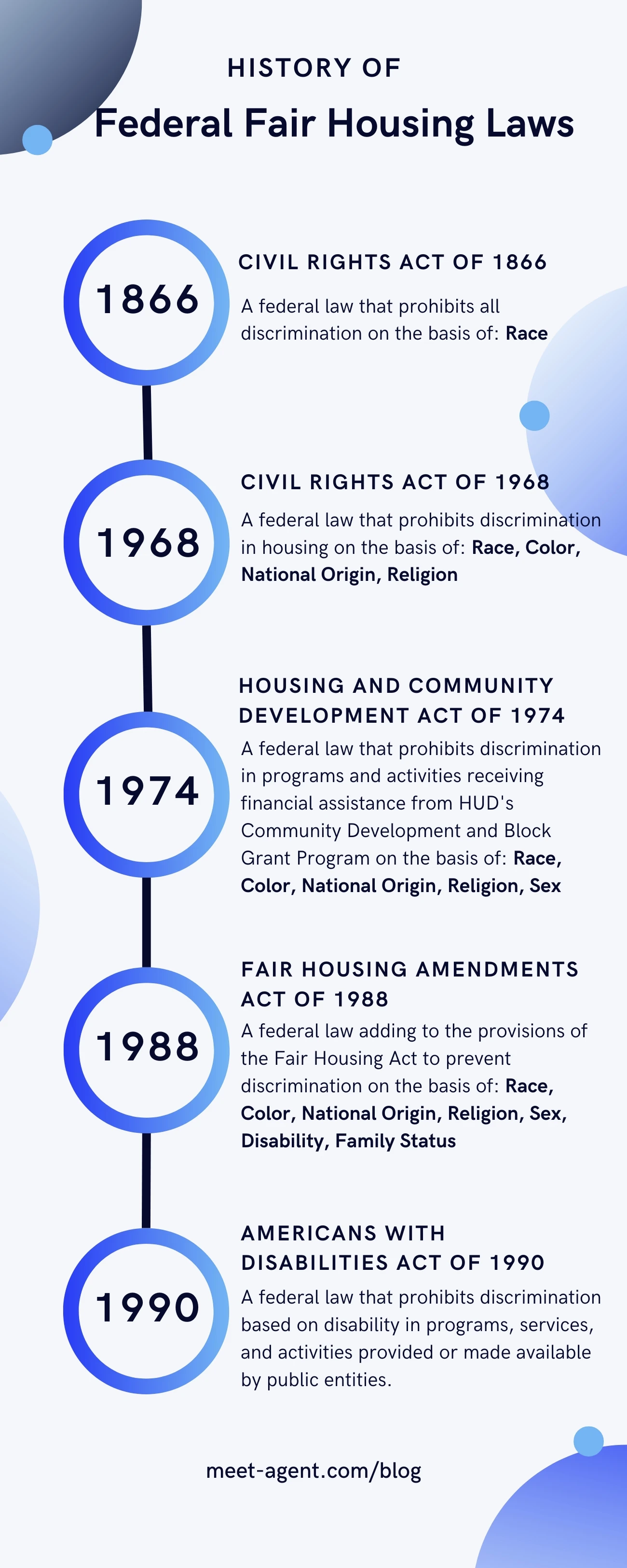Fair Housing Act for Renters: Protecting Your Rights Against Discrimination
Fair housing laws play a pivotal role in upholding the principles of equality and ensuring that everyone has the right to secure housing without facing discrimination. Among these laws, the Fair Housing Act (FHA) stands as a cornerstone of protection for renters against unjust treatment. In a society striving for inclusivity and diversity, fair housing laws are essential for preventing instances of bias and ensuring that individuals are not denied housing opportunities based on their identity. The Fair Housing Act, enacted in 1968, prohibits housing discrimination based on factors such as race, color, national origin, religion, sex, familial status, and disability. This comprehensive legislation not only safeguards individuals' rights but also fosters a more just and equitable rental market.

For instance, consider the case of a single mother seeking to rent an apartment for her family. Under the Fair Housing Act, it is unlawful for a landlord to refuse to rent to her solely because she has children. This protection allows families to secure housing without fear of prejudice. This article delves into the intricacies of the Fair Housing Act, outlining its scope, the protected characteristics it covers, and the various ways it empowers renters to stand against discrimination. Through a detailed exploration of the Act's provisions, renters can gain a better understanding of their rights and how to navigate the rental process while ensuring they are treated fairly and without bias.
Understanding Fair Housing Laws
At the heart of safeguarding renters' rights is the Fair Housing Act (FHA), a federal law enacted to counteract housing discrimination and promote equal access to housing opportunities. The FHA prohibits various forms of discrimination, ensuring that individuals are not denied housing based on their race, color, religion, sex, national origin, disability, or familial status. This broad range of protections emphasizes the Act's commitment to creating a housing environment that is free from bias and prejudice.
For instance, imagine a scenario where a person with a disability is seeking an apartment. If a landlord refuses to make reasonable accommodations for their disability, such as installing a ramp or allowing a service animal, it would be considered a violation of the Fair Housing Act. By exploring the nuances of prohibited discrimination under the Act, renters can become informed advocates for their own rights and contribute to a more inclusive housing landscape. This section of the article delves into the intricacies of the Fair Housing Act, offering clarity on its application and the forms of discrimination it addresses, ensuring that renters are equipped with the knowledge to recognize and respond to potential violations.
Protected Characteristics
The Fair Housing Act extends its protective umbrella over several specific characteristics that landlords and property managers are prohibited from discriminating against. These include race, color, religion, sex, national origin, disability, and familial status. Each of these characteristics is crucial to fostering an environment of fair housing access for everyone, regardless of their background or circumstances.
For instance, if a landlord refuses to rent to a prospective tenant based on their national origin, it constitutes a violation of the Fair Housing Act. Similarly, denying housing to a family with children or imposing different rental terms on them compared to other tenants would also be considered a breach of the Act. These examples illustrate the importance of understanding and upholding the protected characteristics outlined in the Fair Housing Act. By recognizing the red flags of potential discrimination, renters can take proactive measures to assert their rights and ensure they are treated fairly in their housing journey. This section of the article outlines these protected characteristics and provides real-world scenarios to illustrate how discrimination can manifest, empowering renters to stand up against any form of bias they may encounter.
Rental Application and Screening
The Fair Housing Act extends its protective principles to the rental application and screening process, emphasizing the importance of equal treatment for all applicants. Landlords and property managers are required to adhere to the same criteria and processes for every applicant, regardless of their protected characteristics. This means that rental decisions should be based solely on objective factors such as credit history, rental history, and income, rather than personal characteristics.
For example, if a property manager treats an applicant differently because of their race or disability during the screening process, it would constitute a violation of fair housing laws. To ensure compliance, landlords should establish consistent screening criteria and apply them uniformly to every applicant. By maintaining a transparent and unbiased screening process, renters can be confident that their applications are evaluated on the same grounds as others, allowing them to exercise their rights under the Fair Housing Act. This section of the article delves into the significance of consistent and fair screening practices, offering insights into how renters can recognize potential discrepancies and take appropriate action to protect their rights throughout the application process.

Reasonable Accommodations and Modifications
The Fair Housing Act recognizes that individuals with disabilities may require certain accommodations or modifications to fully enjoy and utilize their rented living space. Reasonable accommodations refer to adjustments or changes in rules, policies, or practices that are necessary to ensure equal access for individuals with disabilities. Landlords and property managers are obligated to make these accommodations unless they impose an undue burden on the housing provider or fundamentally alter the nature of the housing.
For instance, if a tenant with mobility impairment requests the installation of grab bars in the bathroom to enhance safety and accessibility, the landlord must reasonably accommodate this request. Denying such a request without valid justification could constitute discrimination under the Fair Housing Act. This section of the article delves into the importance of providing reasonable accommodations and modifications and highlights real-life scenarios where these accommodations have positively impacted the lives of renters with disabilities. By understanding the significance of accommodating individuals' needs, both landlords and renters can foster an environment that promotes inclusivity and equal access to housing opportunities.
Dealing with Discrimination
Recognizing and addressing discrimination in rental practices is crucial to upholding the principles of the Fair Housing Act. This section of the article explores common signs of discrimination in rental situations, such as being treated differently based on protected characteristics like race, religion, or familial status. It emphasizes the importance of being vigilant about these signs and understanding one's rights as a renter. Real-world examples will be provided to illustrate instances where discrimination occurred and how renters can identify these behaviors.
If a renter believes they have been subjected to discrimination, the article offers actionable steps to take. This may involve documenting the discriminatory behavior, gathering evidence, and reaching out to relevant authorities, such as fair housing organizations or government agencies. Providing specific contact information and resources will empower renters to take appropriate action when facing discrimination. By educating renters on how to navigate such situations effectively, this section aims to equip individuals with the knowledge and tools they need to stand up against discrimination and protect their rights in the rental process.
Legal Recourse and Enforcement
When renters encounter discrimination despite their best efforts, there are avenues for legal recourse and enforcement outlined in this section. It explains how renters can file complaints with relevant agencies, such as the U.S. Department of Housing and Urban Development (HUD) or state and local fair housing organizations. Clear steps for initiating a complaint will be provided, along with information about the investigative process that follows.
In cases where discriminatory practices persist, the article also highlights the option of seeking legal action. It discusses the possibility of pursuing a lawsuit against the landlord or property manager involved in the discrimination. The section offers insights into how legal action can lead to financial compensation for damages and changes in discriminatory policies. By shedding light on these legal remedies, renters are empowered to address discrimination head-on, seeking justice and promoting fair housing practices. Real-life case studies and statistics showcasing successful legal actions will underscore the significance of these measures in enforcing fair housing rights.
Conclusion
In conclusion, the Fair Housing Act stands as a cornerstone of ensuring equal access to housing opportunities for all, regardless of their background or identity. This article has explored the critical importance of fair housing rights and their role in fostering inclusive and diverse communities. By preventing discrimination and ensuring equal treatment, the Act helps create a society where everyone has the chance to secure safe and suitable housing.
As renters, it's essential to be well-informed about fair housing laws and the rights they afford. By understanding what constitutes discrimination and being aware of the protected characteristics, renters can actively participate in the fight against housing disparities. This article aims to empower renters to recognize and stand up against discrimination in all its forms, whether overt or subtle. By asserting their rights, renters contribute to the ongoing effort to build a fair and just housing landscape, one where everyone has the opportunity to find a home free from bias.
Looking for local agents?
Search, compare and connect with top-ranked agents. Find the best local agent & lower rates.




